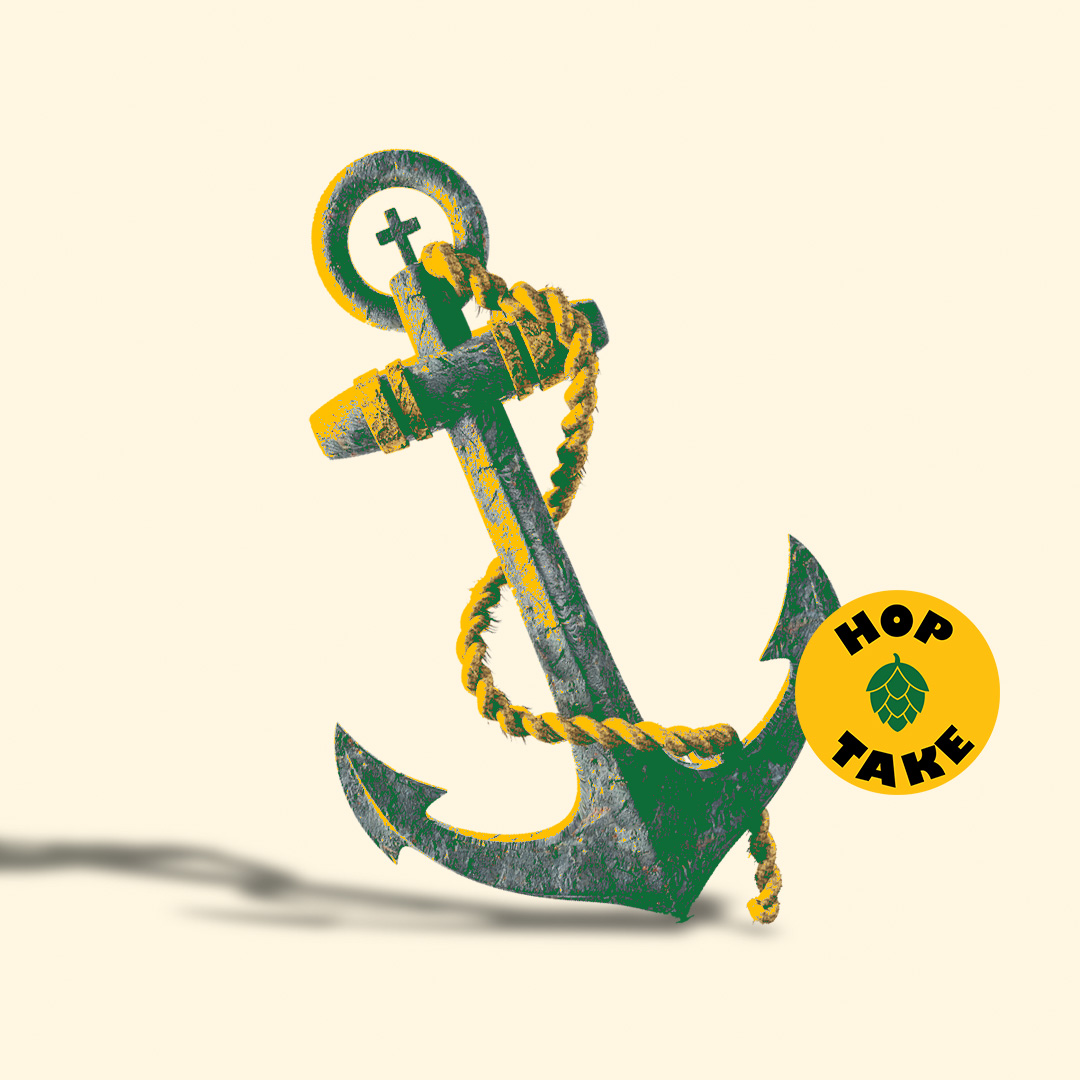Anchor Brewing Company's Demise: A Look Back At Its History

Table of Contents
Anchor Brewing's Rise to Prominence: A Pioneer in Craft Brewing
Anchor Brewing's story is intrinsically linked to the American craft beer revolution. Its journey from a small brewery to a nationally recognized brand is a testament to innovation, quality, and a pioneering spirit.
Early Years and Fritz Maytag's Influence
Founded in 1896, Anchor Brewing Company faced several ownership changes before finding its true calling under Fritz Maytag in 1965. Maytag's visionary leadership breathed new life into the struggling brewery. His commitment to quality and traditional brewing methods was instrumental in transforming Anchor into a craft brewing powerhouse.
- 1965: Fritz Maytag purchases Anchor Brewing Company.
- 1970s: Anchor Steam Beer gains popularity, solidifying its place in the burgeoning craft beer market.
- 1970s-1980s: The brewery expands production to meet growing demand.
- 1980s onwards: Anchor consistently produces high-quality beers, building a strong brand reputation and influencing the craft brewing scene.
These early years cemented Anchor's place as a pioneer in early American craft beer, with Fritz Maytag's influence being crucial to its success. His dedication laid the foundation for Anchor's legacy.
Establishing a Legacy
Anchor Brewing didn't just brew beer; it established a legacy of brewing innovation. Its unique brewing techniques, particularly its steam beer process, set it apart. The distinct characteristics of Anchor Steam Beer, combined with the consistently high quality of beers like Anchor Porter, established the brand as a benchmark for craft brewers.
- Unique Steam Beer process: A distinctive brewing method that gave Anchor Steam Beer its unique character.
- Iconic beer styles: Anchor Porter, Anchor Liberty Ale, and Anchor Steam Beer became synonymous with quality and tradition.
- Strong brand recognition: Anchor Brewing became a recognizable and respected name in the craft beer industry.
Anchor's dedication to quality ingredients and traditional brewing practices, combined with its innovative approach to beer styles, cemented its place in the annals of American craft brewing history.
The Challenges Faced by Anchor Brewing: Factors Contributing to its Decline
Despite its legacy, Anchor Brewing faced significant challenges in recent years that ultimately contributed to its decline.
Increased Competition in the Craft Beer Market
The craft beer market, once a niche sector, exploded in popularity. This rapid growth led to increased competition, with numerous new breweries entering the market, each vying for a share of the consumer base. This market saturation made it harder for even established brands like Anchor to maintain their market share.
- Growth of the craft beer industry: A massive increase in the number of craft breweries across the US.
- Larger breweries entering the market: Big breweries started producing craft-style beers, further intensifying competition.
- Changing consumer preferences: The demand for diverse beer styles and flavors put pressure on established brands to innovate and adapt.
Navigating this fiercely competitive craft beer landscape proved increasingly difficult for Anchor.
Changes in Ownership and Management
In 2017, Anchor Brewing was acquired by Sapporo Holdings, a Japanese beverage giant. This acquisition, along with subsequent changes in management and brewing practices, arguably impacted the brand's identity and performance. Changes in marketing strategies may also have alienated some of its loyal customer base.
- Sapporo acquisition: A significant shift in ownership that altered Anchor's strategic direction.
- Changes in brewing practices: Some changes were met with criticism from long-time Anchor fans.
- Marketing strategy shifts: Adapting to a changing market proved challenging, and some changes were less successful.
The impact of these changes on the brand's performance is a key element in understanding Anchor's decline.
Economic Factors and the Impact of the Pandemic
External economic factors also played a role. Rising ingredient costs, economic downturns, and the devastating impact of the COVID-19 pandemic on the hospitality industry – a key distribution channel for craft beer – all contributed to Anchor's struggles.
- Economic downturns: Recessions negatively impacted consumer spending on premium goods like craft beer.
- Rising ingredient costs: Increased costs of barley, hops, and other ingredients put a strain on profit margins.
- Pandemic impact: The closure of bars and restaurants significantly reduced beer sales.
These external factors compounded the challenges Anchor already faced, creating a perfect storm that led to its eventual sale.
The Sale of Anchor Brewing and its Future
In 2022, Anchor was sold to Japanese beverage giant Sapporo. This concluded a chapter in the long history of this iconic brewery.
The Acquisition by Japanese Beverage Giant, Sapporo
Sapporo's acquisition of Anchor Brewing marked a significant turning point. The terms of the sale remain largely undisclosed, but the future direction of Anchor under Sapporo's ownership remains uncertain. There's potential for revitalization, but also the possibility of further decline.
- Terms of the sale: The specifics of the transaction were not publicly released in detail.
- Sapporo's plans for Anchor: Sapporo's long-term plans for Anchor are still evolving.
- Potential for revitalization or further decline: The future of the Anchor brand remains unclear.
Speculation and Analysis
The future of Anchor Brewing is a subject of much speculation. Can a legacy brand like Anchor successfully navigate the evolving beer market? The ability to adapt and innovate will be crucial for survival.
- Potential for a comeback: With strategic investments and a renewed focus, Anchor could potentially regain its former glory.
- The role of legacy brands: Consumers often show loyalty to established brands, offering an opportunity for revival.
- The changing beer market: Adapting to evolving consumer preferences and trends is vital for any brand's success.
Reflecting on Anchor Brewing Company's Demise
Anchor Brewing's decline highlights the challenges faced by even iconic brands in a dynamic and competitive market. A combination of internal decisions and external factors contributed to its struggles, showcasing the importance of adapting to market changes, the impact of effective management, and the ongoing need for innovation in the craft beer industry. The rise of countless craft breweries, along with the economic impact of a global pandemic, significantly altered the landscape for even this established brand.
Key Takeaways: The story of Anchor Brewing serves as a cautionary tale, emphasizing the importance of adapting to market changes, sound management, and a willingness to innovate to stay competitive. Even legendary brands can fall victim to industry shifts and internal struggles.
What are your thoughts on Anchor Brewing's history and future? Share your memories and perspectives on Anchor Brewing's demise in the comments below.

Featured Posts
-
 Marina Rodriguez Vs Gillian Robertson Who Wins At Ufc Iowa Prediction And Betting Odds
May 04, 2025
Marina Rodriguez Vs Gillian Robertson Who Wins At Ufc Iowa Prediction And Betting Odds
May 04, 2025 -
 Ufc Schedule May 2025 All Events Including Ufc 315
May 04, 2025
Ufc Schedule May 2025 All Events Including Ufc 315
May 04, 2025 -
 Trump Supporter Ray Epps Defamation Suit Against Fox News Details Of The Jan 6 Lawsuit
May 04, 2025
Trump Supporter Ray Epps Defamation Suit Against Fox News Details Of The Jan 6 Lawsuit
May 04, 2025 -
 White House Meeting Mark Carney And Trump To Discuss Key Issues
May 04, 2025
White House Meeting Mark Carney And Trump To Discuss Key Issues
May 04, 2025 -
 Tragedy Strikes Raiwaqa Woman Perishes In House Fire
May 04, 2025
Tragedy Strikes Raiwaqa Woman Perishes In House Fire
May 04, 2025
